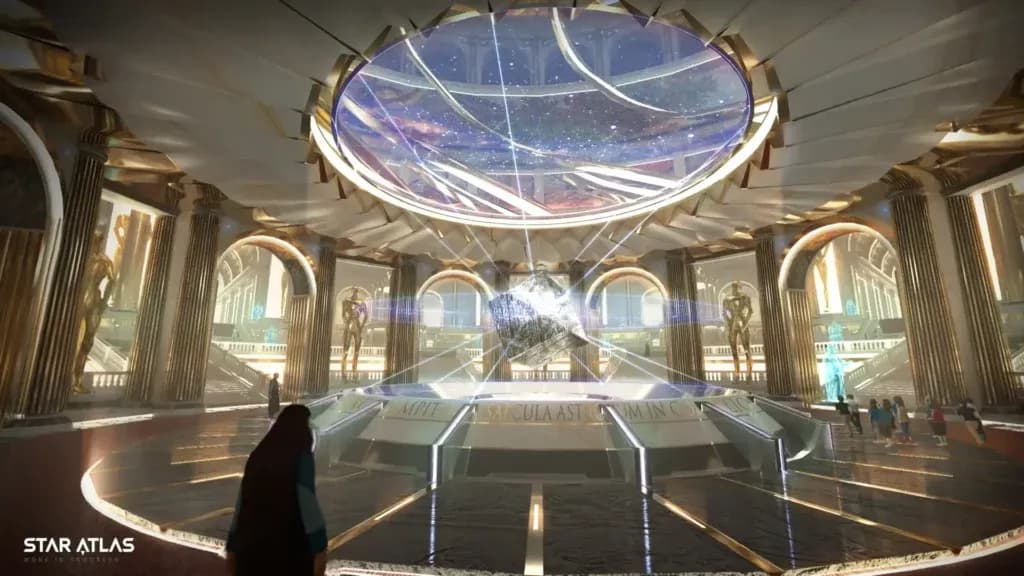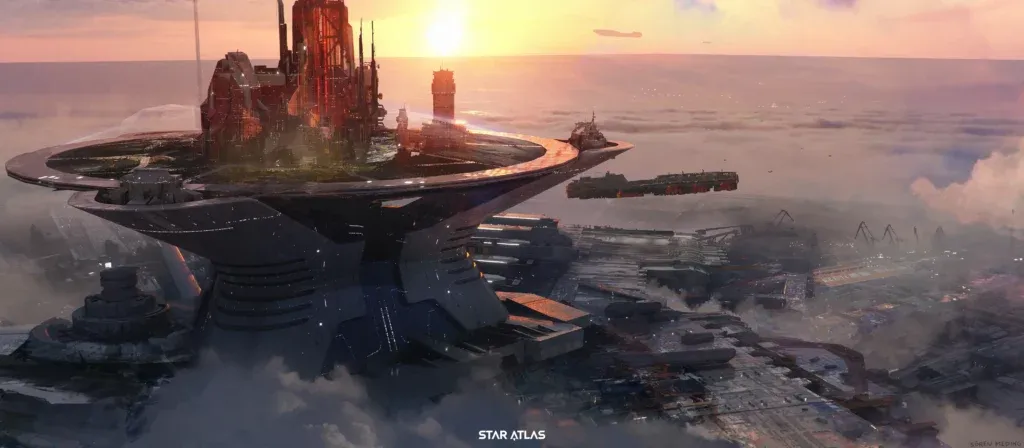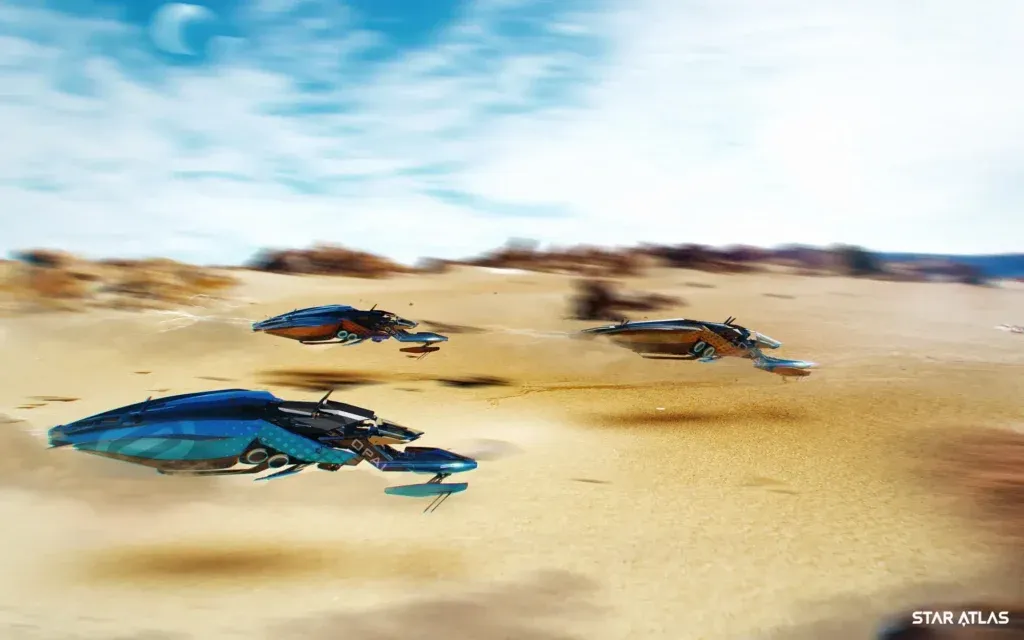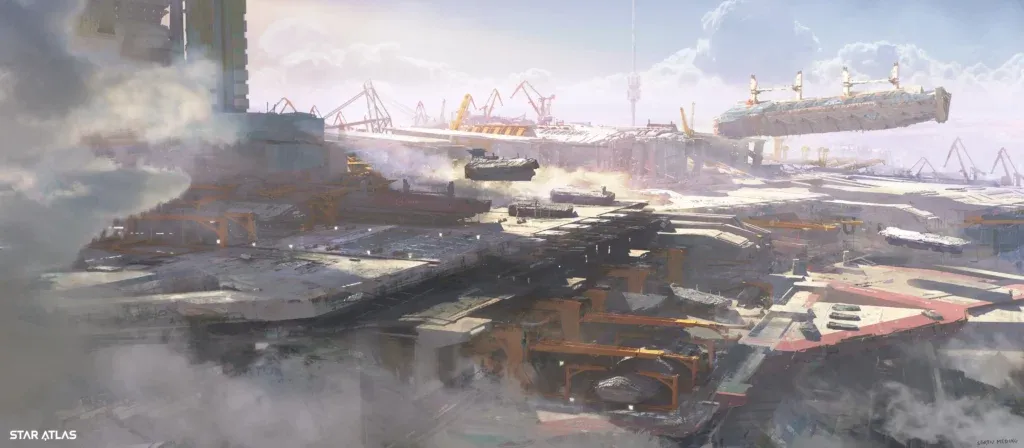Star Atlas aims to redefine the web3 gaming's sci-fi RPG genre. From the moment their trailer dropped, and everyone has been on edge anticipating their next move. The team managed to pull in its community to continuously get involved with the lore and the ongoing battle between the world's three major factions. Star Atlas offers its players a taste of almost every genre, with elements of strategy, RPG, shooters, and even laid back exploration of the galaxy.
We got the opportunity to sit down with the Star Atlas team for an interview to go over everything happening behind the scenes. We got to see the challenges the development studio is facing with integrating blockchain elements into such a complex game and how they are overcoming it, the player-driven economy and similarities to EVE Online, and how the Decentralized Autonomous Corporations can dictate the future of Star Atlas. Let's get right into it.

We will start off simple for everyone to get to know Star Atlas first. If you can please introduce yourself, Star Atlas, and the development studio behind it.
Hello, welcome to Star Atlas, a next-gen gaming metaverse that blends multiplayer video games and decentralized financial technologies with state-of-the-art blockchain and triple A quality graphics.
Built on the Solana blockchain, Star Atlas is a grand strategy game centered around space exploration, territorial control and political domination. In other words, it’s challenging and fun! In addition, all of the assets in the game are NFTs, offering true and lasting ownership and the option to later sell your assets to other players. Using Unreal Engine 5’s Nanite, real-time graphics technology allows for immersive, cinematic quality visuals.
The longer term vision for Star Atlas is an expansion from the game to the broader Star Atlas metaverse, which we believe will be the next generation of the web. Everything from e-commerce experiences, social interaction, general economics and even political and government structures will be reimagined in the coming metaverse.
Regarding the development studio, ATMTA, we are currently the main supporter of the Star Atlas ecosystem, a company of around 240 employees, counting our contractors, that are passionately building this ambitious metaverse experience.
EVE Online and Star Citizen have a lot of comparable elements to Star Atlas. Considering you have similar challenges but with the blockchain technology added on top of that as well, what are you doing to overcome these challenges as they come at?
We undeniably have a huge road ahead of us, and any game of this magnitude is bound to face many challenges. It’s curious that you spoke about those two game development processes because we have used them as a case study for our own endeavor.
After analyzing their trajectory, we decided on an approach where we would focus first on the universe's underlying logic and foundations that is the purpose of our first modules like the Showroom, the Star Atlas DAO, the Galactic Marketplace, and a web-based game module called Project SCREAM. Then we will incrementally build on those foundations, refining and testing them together with the community while also working together with high-tiered partners such as Sperasoft to keep production going on a high standard on all fronts.
On the Blockchain side, we are blessed with one of the best teams in the industry, which managed in a short term build many fantastic integrations and features that will greatly improve the onboarding of developers from the Unreal Engine 5 ecosystem in the Solana blockchain. Our expertise on the blockchain side provided to be an actual handy feature, as it allowed us solutions to various traditional gaming projects that are very difficult to overcome without it.

Why is it important in your eyes to give players the opportunity to have a free market and a player-driven economy?
This is a great question that allows us to explore a few points of our company's reasoning.
First of all, we think that having an actual economy inside the game, where our players are the ones responsible for driving it, is a deeply fun and immersive experience. You can literally see the impact that you and your DAC create on the metaverse of Star Atlas through your participation in the many different economic loops. In Star Atlas the player's decisions matter in a manner that in most games is impossible, giving every aspect of the gameplay more meaning. You can’t have this level of immersion elsewhere.
Second, this is about empowering people and sharing the pie created by our ecosystem. While old games would not grant players the ownership of their assets and would reserve for themselves all the profit made by in-game transactions, here in Star Atlas, the players will be the actual owners of the metaverse structure and assets, as well as the gains that they manage to make through their efforts playing. This is the expression of our motto “Power To The People” on the economic front.

Can you explain further what that means and what would be the constraints to adopt multiple jobs for example at the same time?
Sure! When we decided on the structure of the in-game careers, we tried to come up with a logic underlying the different ingame structures that could forward the following principles:
- Each profession must be a fulfilling game experience in itself.
- It enables the construction of a skill progression system.
- It must be integrated with the whole economy of Star Atlas and balanced
Let’s briefly discuss each of these points.
The first references the idea of careers in Star Atlas being enjoyable gaming experiences. As we did our research regarding careers in Star Atlas, we saw that most of the games in the industry didn’t focus on making playing different careers enjoyable.
We think this logic is bad for the game. If careers are not cool enough to play, people will take them on only for financial rewards. While some people will think this is enough value, others won’t, which may drive them to stay out of the economy of our game.
Although we can’t go into specifics right now, we’re looking forward to making playing each of our careers entertaining! All of them will have an underlying logic and mechanics that will resonate with different gameplay styles, from mining in deep space to racing leagues on low gravity moons. Hopefully, you will quickly find the one that best fits your taste.
The second principle emphasizes the idea of progression. We want you to get better and feel your character improve while you devote yourself to your career in Star Atlas.
As you practice and work in your career, you will receive a range of perks that come from experience and hard work in any area of knowledge. For example, you will be more efficient, meaning that you’ll take less time to complete tasks, and you will receive an increased yield for your efforts.
This is our answer to the question of the possible constraints of having multiple professions in the game. There is no objective obstacle to it, but specialization will be rewarding in Star Atlas, as you can see above, and since many players will be specializing in the many different aspects of the game economy, you might find yourself outpaced by the ones that did specialize.
This dynamic, of course, changes from career to career, but we want our community to feel the effects of career progression in their gameplay as they rise through the ranks of mastery within their crafts.
Finally, every single career is made to be part of an economic loop or game activity with meaningful value for the whole Star Atlas game system. This means, just like in real life, no ingame career is an end in and of itself.
It serves a higher purpose on a political and economic level for Star Atlas, and each one of those careers is balanced in a way that is relevant to the game structure.

The Decentralized Autonomous Corporations is a major concept within Star Atlas, giving players the ability to run entire space-cities from top to bottom. What are you most excited about for players to do with DACs and how do you see it influencing the future of Star Atlas’ success?
Star Atlas is the tale of a shared dream, a dream of a decentralized Metaverse built horizontally rather than vertically, with governance dispersed across the different philosophies that compose our community. It’s also a tale of teamwork and rallying together under a shared purpose. In essence, it’s a tale about our guilds.
Community gameplay is a core feature of the Star Atlas Metaverse.
This becomes clear in the different instances of proposed gameplay disclosed in the white and economic papers of the project.
From the various layers of political governance to the sophisticated economy that requires different and specialized skill sets to function appropriately, whenever we think about any macro objective in Star Atlas, we are thinking about the coordinated efforts of a group of players and a variety of inhabitants in the future metaverse.
It’s not just any kind of coordination, though. The innate economic nature of the assets in Star Atlas takes the central value of human relationships to a whole new level when we are talking about groups of players.
Trust.
It’s possible, especially in your early days of Star Atlas, that you might cooperate casually with different players that you will encounter in the safe zones of the cosmos. But, in the long run, especially in gameplay of the medium and high risk zones, it’s advisable to find a group of players you can trust.
Hence, the DACs (Guilds) are necessary for the Star Atlas Metaverse ecosystem to function properly.
In the long history of online MMOs, the Guilds have become a haven for their members, a place where like-minded individuals share experiences, victories, defeats, and, most of all, fun.
Star Atlas plans to take this concept to a whole new level, providing the Guilds with structural tools never before seen in the history of our industry. Those tools will enable the different organizations to leverage their gameplay capabilities in a permission-less manner.
It’s not an exaggeration to say that the successes of Star Atlas is tied to our DACs activity, and we see them as our most important partners in building the Star Atlas metaverse.
We hope you enjoyed the interview with Star Atlas, and it was our pleasure as well to see everything in the works behind the scenes for Star Atlas. The future looks incredibly bright for the sci-fi title, and the attention it can bring to web3 gaming is undeniably massive.
Let us know your thoughts in the comments section down below and keep an eye out for more upcoming exclusive interviews from across the web3 gaming space. If you haven't already, make sure to check out our earlier interviews with Brent Liang, Founding Team Member at Fractal, Grant Haseley, Executive Director of Undead Blocks, Loopify, NFT influencer and CEO of The Treeverse, and David, CEO of MetaKing Studios and Blocklords.
Join the PGG family today!

